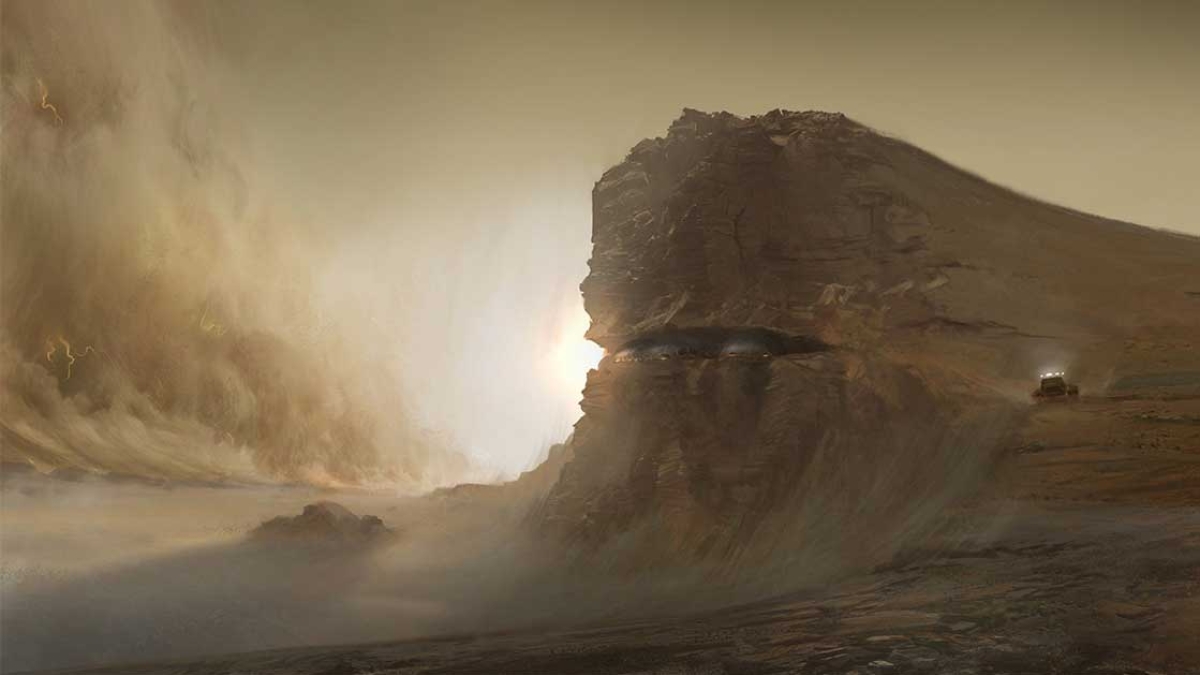Living in space is going to present problems. Lots of them. Heat. Cold. Radiation. Is the company liable for overtime pay when the ship wakes you from cryosleep ahead of time?
One of the more significant problems will, of course, be each other. Don’t cooperate down here, and it just means the neighbors won’t be over for a Saturday barbecue again. Do it up there, and everyone dies.
What legal, political and social norms will govern space exploration? What social structures and practices are necessary to sustain a social unit in space indefinitely?
“Port of Mars” is a card game created by Arizona State University’s Interplanetary Initiative to see how cooperation might shake out in an off-world colony.
Players are members of an early Martian settlement charged with working together to sustain the welfare of the community. Player actions are tracked and behavior analyzed. Researchers examine that data, looking for what behaviors, structures and systems worked, and what failed. Each instance of gameplay is a simulation, a modeling exercise for future space missions.
Project lead Lance Gharavi, an associate professor in the School of Film, Dance and Theatre and affiliated faculty with the School of Earth and Space Exploration, calls Port of Mars “a social science experiment cosplaying as a game.”
“As I like to say, Port of Mars is a rehearsal for the future,” Gharavi said.
In that future, resources will have to be managed and shared. At first glance that seems simple.
Look closer. Walk-only zones on campus are a shared resource that are a constant source of negotiation among travelers. Electric scooters and their ban are another example of how views differ on the management of shared resources.
Marco Janssen, lead social scientist on the project, is an expert in how communities manage shared resources, such as groundwater resources.
“When I got introduced to the Port of Mars project, I noticed that the problems future space explorers will experience are similar to farmers in India who use groundwater, or residents in Mexico City trying to derive potable water,” said Janssen, a professor in the School of Sustainability and director of the Center for Behavior, Institutions and the Environment. “They have to invest time and effort in building and maintaining shared infrastructure. However, there is an important difference on Mars. The consequences of not sufficient cooperation in building and maintaining shared infrastructure quickly end up to a lack of oxygen or another life support system. Hence the consequence of insufficient contributions can lead to the death of the Mars habitat.”
Players can invest in an opportunity with direct benefit to them, or they can invest in the health of the community.
“If the total investment in community health was not sufficient at any time, it was game over and nobody received any rewards,” Janssen said. (Janssen co-ran a project a couple of years ago where eight students lived in the Mohave desert on four gallons of water a day and no air conditioning.)
Space exploration is not, as is frequently stated, a way to start over again on another planet, Janssen said.
“The level of cooperation and coordination needed to succeed are much higher than we have observed in large-scale societies on planet Earth,” he said. “Although there might be a planet B, we need to be able to address problems like climate change and infectious diseases effectively on planet Earth before a society on Mars is a viable option. This demonstrates that space research also provide venues for social science to explore cooperation in extreme conditions which can help to solve existing problems at planet Earth.”
The game will help us understand some of the social aspects of inhabiting Mars, Tanya Harrison said. Mars is a familiar place to Harrison, a planetary scientist and member of the Mars Opportunity Rover’s science team.
“The technology is likely easier for us to deal with than the human factor, because traveling to and living on Mars will be something completely new to humanity,” Harrison said. “No level of simulations will truly be able to prepare us (in my opinion), but doing research like this can at least help us better understand the social challenges we might face so that we can find ways to mitigate the potential damages.”
Currently the game is only available to ASU students because data from results has to be collected.
ASU’s Interplanetary Initiative is a pan-university effort to build the future of humans in space and create a bolder and better society. Questions of our space future across the whole landscape of human inquiry need to be explored by teams integrating across the public-private-university sectors.
Top Illustration by Titus Lunter
More Science and technology

ASU water polo player defends the goal — and our data
Marie Rudasics is the last line of defense.Six players advance across the pool with a single objective in mind: making sure that yellow hydrogrip ball finds its way into the net. Rudasics, goalkeeper…

Diagnosing data corruption
You are in your doctor’s office for your annual physical and you notice the change. This year, your doctor no longer has your health history in five-inch stack of paperwork fastened together with…
Large-scale study reveals true impact of ASU VR lab on science education
Students at Arizona State University love the Dreamscape Learn virtual reality biology experiences, and the intense engagement it creates is leading to higher grades and more persistence for biology…


